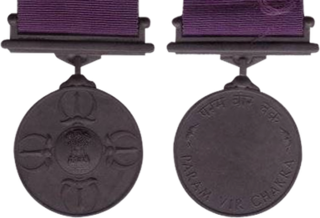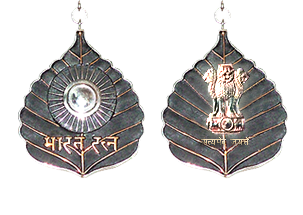In the United Kingdom and the British Overseas Territories, personal bravery, achievement, or service are rewarded with honours. The honours system consists of three types of award:
The Australian honours and awards system refers to all orders, decorations, and medals, as instituted by letters patent from the Monarch of Australia and countersigned by the Australian prime minister at the time, that have been progressively introduced since 14 February 1975. The Australian honours and awards system excludes all state and local government, and private, issued awards and medals.
The Padma Bhushan is the third-highest civilian award in the Republic of India, preceded by the Bharat Ratna and the Padma Vibhushan and followed by the Padma Shri. Instituted on 2 January 1954, the award is given for "distinguished service of a high order...without distinction of race, occupation, position or sex." The award criteria include "service in any field including service rendered by Government servants" including doctors and scientists, but exclude those working with the public sector undertakings. As of 2020, the award has been bestowed on 1270 individuals, including twenty-four posthumous and ninety-seven non-citizen recipients.

The Param Vir Chakra (PVC) is India's highest military decoration, awarded for displaying distinguished acts of valour during wartime. Param Vir Chakra translates as the "Wheel of the Ultimate Brave", and the award is granted for "most conspicuous bravery in the presence of the enemy". As of January 2018, the medal has been awarded 21 times, of which 14 were posthumous and 16 arose from actions in Indo-Pakistani conflicts. Of the 21 awardees, 20 have been from the Indian Army, and one has been from the Indian Air Force. Major Somnath Sharma, was the first recipient. A number of state governments of India as well as ministries of the central government provide allowances and rewards to recipients of the PVC.

The Indian Order of Merit (IOM) was a military and civilian decoration of British India. It was established in 1837, although following the Partition of India in 1947 it was decided to discontinue the award and in 1954 a separate Indian honours system was developed, to act retrospectively to 1947. For a long period of time the IOM was the highest decoration that a native member of the British Indian Army could receive and initially it had three divisions. This was changed in 1911 when Indian servicemen became eligible for the Victoria Cross. A civilian division of the IOM also existed between 1902 and 1939, however, it was only conferred very rarely.

The Pride of Performance, officially known as Presidential Pride of Performance, is an award bestowed by the Islamic Republic of Pakistan to recognize people with "notable achievements in the field of art, science, literature, sports, and nursing". The Pride of Performance is the highest national literary award of Pakistan conferred upon its citizens and, while it recognizes literary contribution, it can also be conferred upon foreign nationals. It is usually awarded by the president once a year at the Pakistan resolution day, but announcements are made at independence day ceremony held on 14 August. The award recommendations are made by the country's administrative units or respective ministry to the state governments where officials send it to the Cabinet Secretariat and then president or federal government for final approval.
South African orders, decorations and medals are those military and civilian orders, decorations and medals issued by the Government of South Africa. The following is a (non-exhaustive) list of these:

The Nishan-e-Pakistan is the highest civilian award of the Islamic Republic of Pakistan. It is awarded for "those who have rendered services of highest distinction" to the national interest of Pakistan. Nishan is awarded to government officials and civilians, including citizens of Pakistan and foreign nationals. In the Pakistan honours system, Nishan-e-Pakistan is equivalent to Nishan-e-Haider, the highest military gallantry award. Established on 19 March 1975 under the Decorations Act, 1975, the award is not correlated to the rank or status of a person.
Tamgha-e-Imtiaz also spelled as Tamgha-i-Imtiaz, is a state-organised honour of Pakistan. It is given to any civilian in Pakistan based on their achievements. While it is a civilian/military award, it can be bestowed upon officers of the Pakistan Armed Forces and worn on their uniform. It can also be awarded to foreign citizens who have performed great service to Pakistan.

The Indian honours system is the system of awards given to individuals for a variety of services to the Republic of India. The categories of awards are as follows:
The Gesetz über Titel, Orden und Ehrenzeichen, often shortened to Ordensgesetz, is a federal law of Germany detailing the treatment and handling procedures for civilian and military decorations. The law was put into effect on July 26, 1957, and fulfilled two primary purposes. First, it stipulated how medals and military decorations from before 1945 should be handled. Second, it was intended to describe treatment and procedures for medals in the Federal Republic of Germany.
Ireland has no formal honours system. Proposals to introduce one have been made by various groups at different times. The Order of St. Patrick, established by the British monarchy in the Kingdom of Ireland in 1783, has been in abeyance for decades. The Constitution of Ireland mandates that "Titles of nobility shall not be conferred by the State."

The Cross for Bravery was instituted by the State President of the Republic of Transkei, for award to all ranks as a decoration for bravery.
The Pakistan Civil Awards were established on March 19, 1957, following the proclamation of Pakistan as an independent republic on March 23, 1956. The announcement of civil awards is generally made once a year on Independence Day, August 14, and their investiture takes place on the following Pakistan Day, March 23. According to Article 259 of the Constitution of Pakistan 1973, along with the Decorations Act, 1975, the President of Pakistan confers civil awards on Pakistani citizens in recognition of gallantry. Awards for Pride of Performance are conferred for outstanding achievements in the fields of art, literature, science, sports and nursing.
The Honours and Awards System of Samoa has its basis in the Merit Act 1992/1993 and the Honours and Awards Act 1999. From 1914 to 1962, Samoa was governed as the Western Samoa Trust Territory by the United Kingdom and New Zealand. During this time, awards of the British honours system were made to select individuals. For example, the first Prime Minister of Samoa, Fiame Mata'afa Faumuina Mulinu'u II was made a Commander of the Order of the British Empire and Le Mamea Matatumua Ata, a framer of the constitution of Samoa, was made an Officer of the Order of the British Empire on the New Zealand list in the 1960 Birthday Honours.
Hilal-e-Pakistan is the second-highest civil award of the Islamic Republic of Pakistan. The award seeks to recognize those people who have made "meritorious contribution to the national interests of Pakistan, or cultural, social contribution, or other significant public or private endeavors". The award is not limited to Pakistani citizens. While it is a civilian award, it can also be conferred upon foreign nationals. It is bestowed by the president of Pakistan once a year on the eve of Independence day.

Quaid-e-Azam Police Medal is a gallantry award bestowed by the Islamic Republic of Pakistan to law enforcement agencies, particularly police personals to recognize their meritorious contribution to the national interest of Pakistan, and while it is a gallantry award it is also awarded posthumously.
Sitara-e-Shujaat, sometimes spelled Sitara-i-Shujaat, is the second-highest civil award for bravery bestowed by the Islamic Republic of Pakistan. It is usually awarded to the Pakistani citizens such as civilians, human rights defenders, military or law enforcement officials for their bravery contributions to the national interest of the country, and while the award seeks to recognize the "gallantry contributions", it is also awarded posthumously by the president annually on the Pakistan Day.







